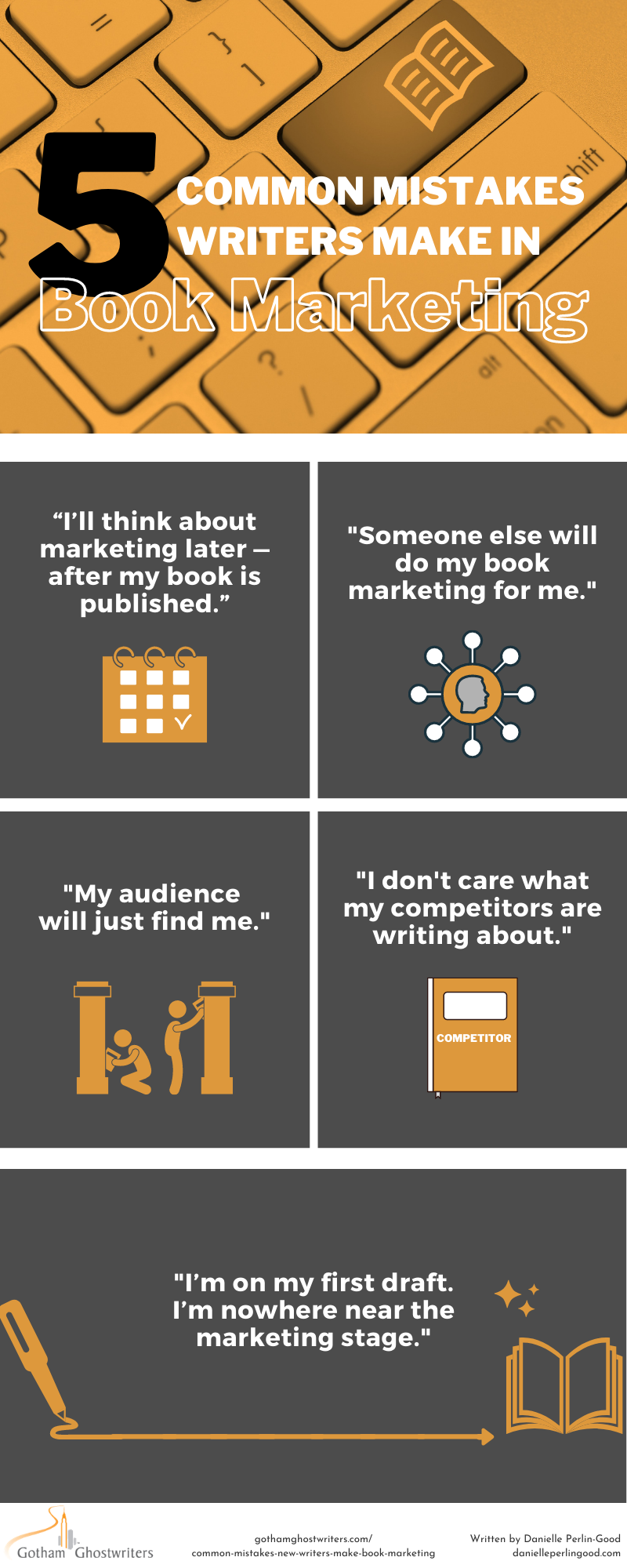Over the course of my years as a writer, editor, and digital marketer, I’ve come across hundreds of authors, or aspiring writers, who are incredibly confused, overwhelmed, and aggravated about the marketing process. Even though you may consider yourself to be a writer, you need to also consider yourself as a marketer if you want readers to find your work, regardless of which publishing avenue you choose.
In order to find your target audience, you must create visibility for yourself, have an accessible presence, and be able to differentiate yourself and your unique perspective. Although these tasks may seem daunting, I recommend breaking them down, one simple step at a time.
Mistake #1: “I’ll think about marketing later — after my book is published.”
This is the cardinal rule I always explain to my clients: Do not ever publish your book without a marketing plan. I’ve presented at local libraries, synagogues, and virtual events, and after each event, there’s always at least one person who wants to know why their book isn’t selling. The usual answer? Because they didn’t think to wear their marketing hat pre-publication.
On average, I tell my clients that they need to budget at least $1,000 for ad spend, giveaways, and more before launch day. Once the manuscript is finalized, I also recommend giving yourself 3-6 months at minimum to develop a concrete marketing strategy. If you do not want to do all of the implementation yourself, you can find a virtual assistant to help you complete each task.
Mistake #2: “Someone else will do my marketing for me.”
This is a dangerous sentence to believe, whether you plan to self-publish, use a hybrid publisher, or try to go traditional with an agent. Building an author platform is critical to the success of your book. If your readers can’t find you, then sales will deplete. Creating visibility for yourself also allows your unique message to serve your readership. You want to showcase your true, authentic self to your people so they can follow you, learn from you, and want to keep reading your materials, including your future books.
By depending on others to do your marketing, you’re telling the world, “I don’t care enough about my story to tell you about it. I just cared enough to write about it.”
Marketing is a done-with-you service, not a done-for-you service. You know your story, and your “why,” better than any publicist. While a marketing service can guide you in finding your voice and your target audience, I believe each author needs to have a presence online in their own right in order to relate to their readers on a foundational and personal level.
Nowadays, publishing companies expect that their authors will do about 95% of their own marketing. It’s common knowledge that publishers will also look at one’s author platform before deciding to take on their book project. A large number of social media followers can be a huge advantage to creating success.
Mistake #3: “My audience will just find me.”
I hate to be the one to tell you this, but the majority of readers won’t just come across your book at their local bookstore.
One of the easiest ways to attract new readers is to start an email list. Email your people on a consistent basis, whether that’s weekly, bi-weekly, or monthly. Unlike your social media accounts, which are important, you own your email list.
According to campaignmonitor.com, the average small business Facebook ad spend is $1000-$2000 a month. By comparison, email marketing costs start at just $9 a month for up to 2500 emails, and the ROI is as high as $38 for every $1 spent.
Another simple way to begin creating your author platform is to design a basic website. You do not need to hire a fancy web designer and have all of the bells and whistles. You only need a way for your readers to find you online. You can also consider podcast interviews, guest blog posts, and becoming an active member of Facebook groups that adhere to your audience’s likes.
You can somewhat rely on Amazon, Goodreads, paid ads, your publishing company’s marketing department, but it’s important to have your own platform and promote to your people. Your platform allows your readers to form know, like, and trust factors, all of which are crucial to the success of your book.
Mistake #4: “I don’t care what others are writing about.”
Competitor titles are actually a fantastic way to not only see what others are writing about, but also what readers think about their work. I recommend looking at Amazon and Goodreads reviews on books within your genre so writers can tell who’s in their target audience, and what those readers are saying about these particular titles. Exploring these nuggets will give you incredible insight into what your ideal readers want in a good book.
There is a fine line, though, between researching and imposter syndrome. If you’re finding that completing this competitor research is too taxing and is preventing you from moving forward with marketing your book, take a break. Go on a walk, listen to some upbeat music, or do a yin yoga video.
Mistake #5: “I’m on my first draft. I’m nowhere near the marketing stage.”
One of the first questions I ask in my complimentary clarity calls is, “Who’s your ideal target audience?” There’s usually a long pause on the other end of the virtual meeting, and the aspiring author doesn’t always know how to respond.
Even if you are just starting your manuscript, meaning you have a concept or idea and an unfinished first draft, you need to consider who this book is for and why they need to read it. What value will this book bring to them in their lives? How will their thoughts, dreams, goals, and aspirations change as a result of the information or ideas you provide in your book? Consider the importance of these questions in the beginning of the writing process.

Author
-
Danielle Perlin-Good is The Written Legacy Coach. She helps entrepreneurs, coaches, and speakers elevate their credibility by unleashing their powerful legacies so they can transform and inspire lives. Since 2008, Danielle has edited hundreds of articles, books, social media content, e-newsletters, and more. She went from working overnight shifts at the Tribune Company to corporate digital marketing gigs, one of which was at Albert Whitman & Co., an esteemed children’s publishing house. Danielle uses mindset techniques, exceptional editing skills, and visualization exercises to ensure her clients develop a beautifully crafted and publishable book that they will forever cherish.
View all posts



